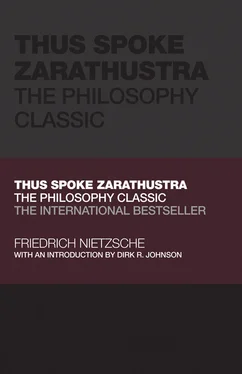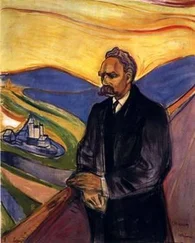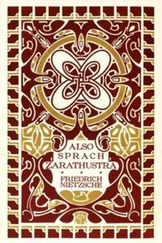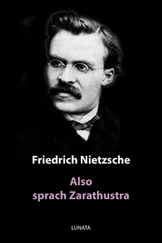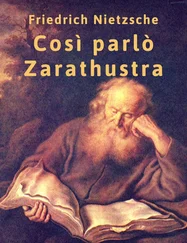Friedrich Nietzsche - Thus Spoke Zarathustra
Здесь есть возможность читать онлайн «Friedrich Nietzsche - Thus Spoke Zarathustra» — ознакомительный отрывок электронной книги совершенно бесплатно, а после прочтения отрывка купить полную версию. В некоторых случаях можно слушать аудио, скачать через торрент в формате fb2 и присутствует краткое содержание. Жанр: unrecognised, на английском языке. Описание произведения, (предисловие) а так же отзывы посетителей доступны на портале библиотеки ЛибКат.
- Название:Thus Spoke Zarathustra
- Автор:
- Жанр:
- Год:неизвестен
- ISBN:нет данных
- Рейтинг книги:5 / 5. Голосов: 1
-
Избранное:Добавить в избранное
- Отзывы:
-
Ваша оценка:
- 100
- 1
- 2
- 3
- 4
- 5
Thus Spoke Zarathustra: краткое содержание, описание и аннотация
Предлагаем к чтению аннотацию, описание, краткое содержание или предисловие (зависит от того, что написал сам автор книги «Thus Spoke Zarathustra»). Если вы не нашли необходимую информацию о книге — напишите в комментариях, мы постараемся отыскать её.
Thus Spoke Zarathustra: A Philosophy Classic, Thus Spoke Zarathustra: A Philosophy Classic
Thus Spoke Zarathustra — читать онлайн ознакомительный отрывок
Ниже представлен текст книги, разбитый по страницам. Система сохранения места последней прочитанной страницы, позволяет с удобством читать онлайн бесплатно книгу «Thus Spoke Zarathustra», без необходимости каждый раз заново искать на чём Вы остановились. Поставьте закладку, и сможете в любой момент перейти на страницу, на которой закончили чтение.
Интервал:
Закладка:
ISBN 9780857089311 (ePub)
ISBN 9780857089328 (ePDF)
AN INTRODUCTION
Dirk R. Johnson
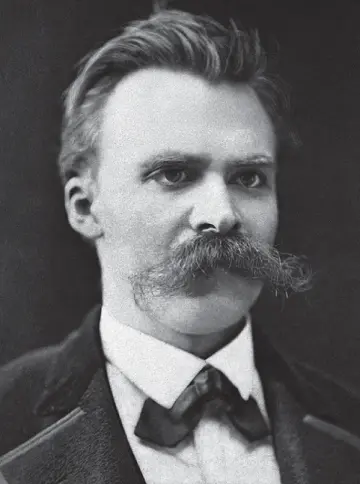
Friedrich Nietzsche c. 1875, by German photographer and portrait painter Friedrich Hermann Hartmann.
Thus Spoke Zarathustra arrived like a lightning bolt in the history of Western literature and thought. Nothing Nietzsche had written prior to Zarathustra foreshadowed the ambition of this endeavor. He himself commented on its singularity: the combined acuity of two hundred years, he claimed, could not have guessed that the same author of his earlier work was the visionary of Zarathustra . 1
It stands out in its combination of poetry, narrative, parody, self‐mockery, grandeur, and sublimity, all while leaving its possible messages and intentions hidden from view. Zarathustra was a leap beyond anything else Nietzsche had written, but it was also a break from the history of philosophy. One need only contrast its enigmatic nature with that of the work of Nietzsche's immediate predecessor, Immanuel Kant.
Its quality of mystery has intrigued and confused interpreters. What is Zarathustra about ? What is its goal? Does it have one? Does it appeal to a future higher humanity or is it merely self‐indulgent, reveling in its own allusiveness, playfulness, and literary perfection?
Part of its enduring appeal is that it leaves these questions unanswered, intentionally. At the same time, its suggestiveness has motivated intrepid readers to try to decipher its mysteries and unravel its riddles. Like a Rorschach test, it invites its readers to make sense of its countless metaphors, symbols, and images. It is intimately connected with the spirit of the time that it reflects, yet rejects that spirit, and wishes to speak to and overcome it.
For this very reason, every generation approaches the text with fresh eyes and sensibilities. While the first generation of readers saw in it a blueprint for a future humanity, a more recent generation may be drawn to its playful, open‐ended, and resonant language. Indeed, first‐time readers are often transported or overwhelmed by its evocative images and metaphors. There are those who only read Zarathustra among Nietzsche's writings, and who consider it their favorite work. Others have the opposite reaction and appreciate Nietzsche's other texts while shunning the visionary Zarathustra .
Zarathustra is indeed difficult to interpret. This task of understanding is further complicated if one is unaware of the rest of Nietzsche's philosophy. While first‐time readers can appreciate it without knowledge of those writings, they should approach the work with guarded enthusiasm and caution as well as humility. Especially if one considers that Nietzsche regarded his entire philosophical work to be a running commentary to his greatest masterpiece: Zarathustra .
WHO IS ZARATHUSTRA?
The historical Zarathustra was a legendary Iranian religious figure. Living approximately in the second millennium BCE, he is considered the world's first prophet. During the Enlightenment, both Voltaire and Mozart treated him as a noble, tolerant forerunner of a pre‐Christian religion. In his comic opera, The Magic Flute , Mozart incorporated a version of Zarathustra – or Zoroaster , in his more common designation. Their cultural example may have served as one inspiration.
The vagueness of the historical figure must have equally attracted Nietzsche. The fact that little was known about him, and yet he assumed a mythic stature, allowed Nietzsche to utilize the character of Zarathustra to awaken grander associations and aspirations. At the same time, he could fill the empty vessel with his philosophical content. In that way, he channeled the mythic quality of the legendary prophet and placed him into a modern setting that reflected the ambivalences and tensions of his times.
Above all, Nietzsche directed his readers' attention to the major reason he had chosen the figure. Nietzsche stated that Zarathustra was the first to have seen the struggle of good and evil as the true wheel of human history – morality as a form of metaphysics. Since he had created the fateful error, he would have to be the first to recognize his mistake. 2
For Nietzsche's purposes, and our understanding of the text, it is irrelevant if Zarathustra could be made responsible for such a momentous historical event. It was only important that Nietzsche used him for his personal objective of discovering the error of morality.
If Zarathustra is about anything , then, it is about the uncovering, and his protagonist's personal overcoming, of historical morality – that fateful error.
NIETZSCHE'S EARLY YEARS
All roads did not lead to Zarathustra . Nietzsche's early career as a student of philology paved the way for a future vocation as a professor. By all accounts, he was a promising scholar of antiquity. He received a position at the University of Basel, in 1869, at the precocious age of twenty‐four, solely based on a recommendation from his mentor. His academic future was set.
Then the unexpected happened: Nietzsche published a controversial interpretation of the ancient world, The Birth of Tragedy (1872). This text turned the mainstream views of the Hellenic age on their head. It was an ambitious reconfiguration influenced by his friendship with Richard Wagner. Nietzsche had met Wagner as a student in Leipzig, in 1868, and the composer enlisted him in his project of cultural rejuvenation.
In trying to establish an intellectual grounding for Wagner's enterprise, Nietzsche challenged the consensus verdict on ancient Greece. The traditional view was that the culture was the product of noble, ethically superior individuals. He suggested instead a darker undercurrent. He uncovered two conflicting forces at work: the Apollonian and the Dionysian. While the Apollonian reflected the sober and rational side of Greek life, the Dionysian flipside of their being tended toward irrational excess. The result of that productive tension was Attic tragedy, the cultural height of ancient Greece.
Two insights here were of great importance connected to Nietzsche's later Zarathustra . One was the study's focus on the Greek god Dionysus and his profound significance for the ancient world. The other was Nietzsche's suggestion that ancient Greek tragedy was at its highest point when it was killed off by Socrates. He could not grasp the deeper significance of the tragic worldview, and his rationalism undermined the basis for tragic art.
Despite its undisputed brilliance, The Birth of Tragedy elicited a fierce backlash among academic colleagues. They criticized it for its overarching speculations and its lack of scholarly grounding. An academic review by a young, up‐and‐coming scholar damaged Nietzsche's reputation. It led him to distance himself from his profession and ultimately to retire from it completely.
The disappointment with the opposition to his first work, along with recurring ill health, were the main factors that led him to relinquish his position at Basel. But another overriding factor was the cooling of his relationship with Wagner and his disenchantment with their shared cultural ideal. Nietzsche now regarded his earlier commitments, both to his profession and to Wagner, as a false start and a distraction from his own preoccupations and concerns.
WANDERING YEARS
Nietzsche now embarked on a ten‐year (1879–1888) itinerant lifestyle that took him further away from his native Germany and to a range of European locales: Sils in Switzerland, Nice in France, Genoa and Turin in Italy. All the while he read widely. Aside from the ancients, whose works, as a scholar of antiquity, he already knew well, he added to the list more contemporary literature, such as the French moralists and novelists, English moralists, and Russian authors, as well as classical works of European literature.
Читать дальшеИнтервал:
Закладка:
Похожие книги на «Thus Spoke Zarathustra»
Представляем Вашему вниманию похожие книги на «Thus Spoke Zarathustra» списком для выбора. Мы отобрали схожую по названию и смыслу литературу в надежде предоставить читателям больше вариантов отыскать новые, интересные, ещё непрочитанные произведения.
Обсуждение, отзывы о книге «Thus Spoke Zarathustra» и просто собственные мнения читателей. Оставьте ваши комментарии, напишите, что Вы думаете о произведении, его смысле или главных героях. Укажите что конкретно понравилось, а что нет, и почему Вы так считаете.
